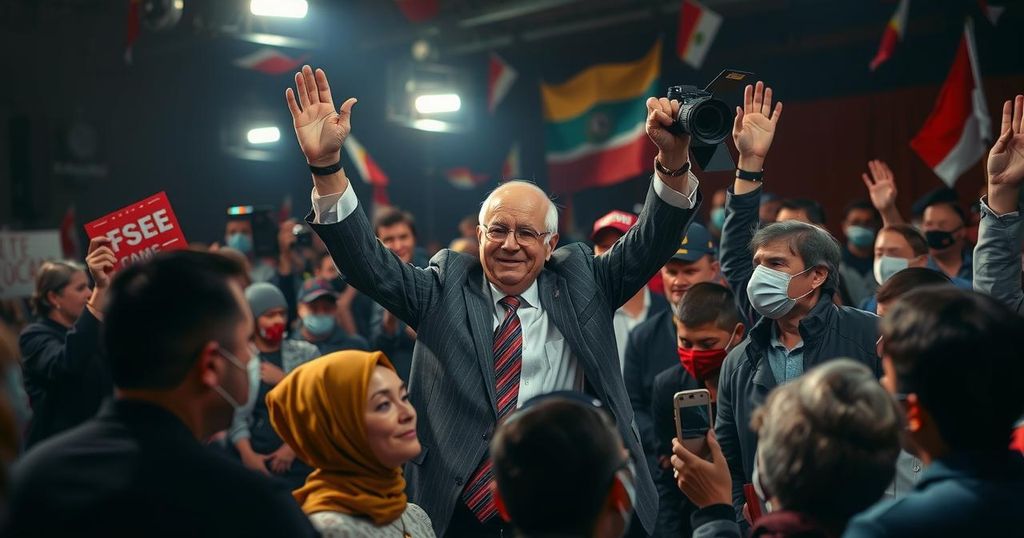Electoral Fallout: Georgian Dream Party Declares Victory Amid Opposition Protests
The ruling Georgian Dream party has won Georgia’s parliamentary elections, securing over 54 percent of the vote. Despite this victory, opposition parties have condemned the elections as fraudulent, labeling it a “constitutional coup.” Allegations of voter intimidation and electoral misconduct have arisen, with leaders of the opposition vowing not to recognize the results. Georgian Dream’s win ensures control over the parliament but lacks the necessary majority for constitutional changes.
The recent parliamentary elections in Georgia have concluded with the ruling Georgian Dream party emerging victorious, as announced by the electoral commission. With over 99 percent of votes counted, Georgian Dream secured more than 54 percent of the votes, equating to approximately 89 seats in the 150-seat parliament. Despite maintaining governing authority, the party fell short of an absolute majority necessary for constitutional amendments. The election results have incited considerable unrest among opposition groups, who have branded the electoral process a “constitutional coup.” They allege widespread electoral fraud and have declared intentions not to recognize the results. For instance, Tina Bokuchava, head of the opposition United National Movement, described the outcome as “falsified,” asserting, “This is an attempt to steal Georgia’s future.” Nika Gvaramia, leader of the Ahali party, also criticized the elections as a governmental maneuver to maintain power. Moreover, serious allegations of voter intimidation and fraudulent activities have been raised by various observers, adding to the calls for the annulment of the election results. Georgian Dream founder Bidzina Ivanishvili celebrated the victory, citing it as a testament to the party’s resilience amid external pressures, particularly concerning geopolitical tensions involving Russia. His assertion comes as the party’s campaign focused on portraying itself as a bulwark against potential war threats, a narrative that resonates in a country grappling with the impacts of past conflicts. However, the opposition and some members of civil society express growing concern over the nation’s shift towards authoritarianism and the weakening of democratic norms, articulating fears about Georgia’s potential alignment with more oppressive regimes. As observers, including international organizations like the Organisation for Security and Co-operation in Europe, prepare to evaluate the electoral process, the future of Georgia’s political landscape remains uncertain, particularly regarding its aspirations for European Union integration against a backdrop of increasing domestic dissatisfaction and claims of electoral malpractice.
Georgia’s recent parliamentary elections have unfolded amidst significant political tensions, particularly between the ruling Georgian Dream party and opposition factions advocating for closer ties with the European Union. With a historical context of post-Soviet political dynamics and Russia’s influence in the region, these elections were deemed crucial not only for domestic governance but for Georgia’s trajectory towards EU membership. The ruling party’s historical support has been tempered by concerns over authoritarian governance, prompting ongoing debates about democratic integrity and civil rights within the country. The elections are viewed as a litmus test of Georgia’s commitment to democratic principles and its strategic geopolitical interests, considering the ongoing conflict in Ukraine and the repercussions of Russian expansionism.
In summary, the parliamentary elections in Georgia have resulted in a reaffirmation of the ruling Georgian Dream party’s control, despite substantial opposition backlash decrying the electoral legitimacy. Accusations of electoral malpractice and claims of a democratic regression underscore the polarized nature of Georgia’s political arena, exposing deep-rooted fears regarding the persistence of authoritarianism and the waning prospects for European integration. The international community’s scrutiny over these developments will be pivotal in shaping Georgia’s future engagements on the global stage.
Original Source: www.aljazeera.com




Post Comment